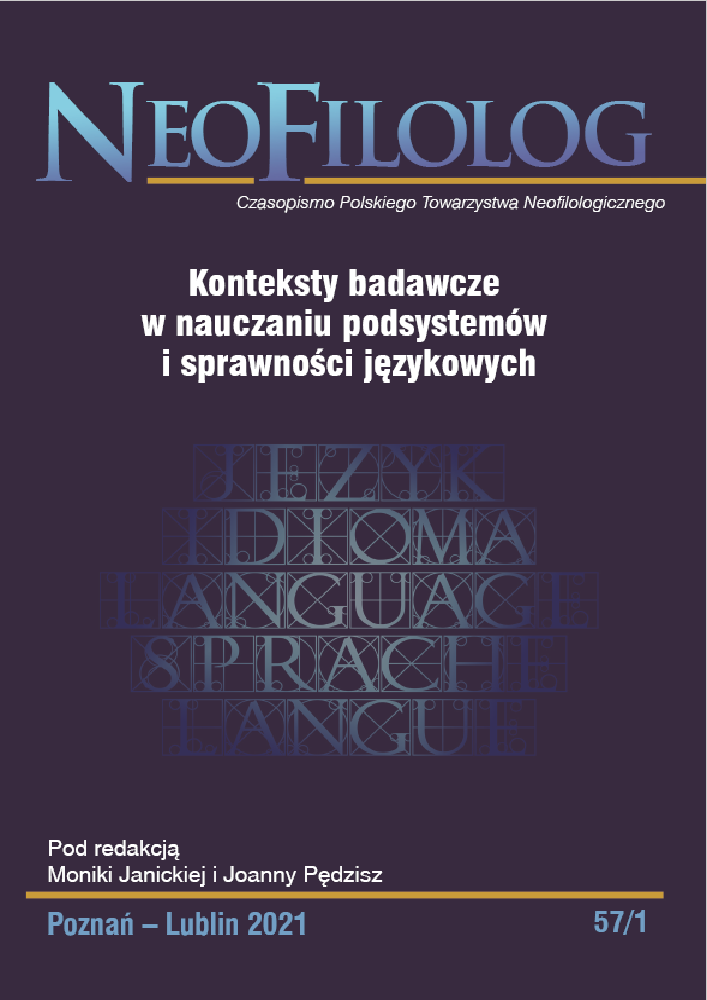Résumé
While learning a foreign language, students have to practice speaking through different activities in class. Unfortunately, speaking is often a challenge for students not only due to linguistic difficulties, but most importantly because of the stress caused by talking in a foreign language in front of their classmates. This phenomenon, called language anxiety, makes it impossible for some students to participate actively and thus to develop their speaking abilities. It is therefore important to understand which types of tasks cause the highest anxiety levels, as well as to find out what can help students overcome their anxiety. To answer these questions, we led a research among Polish high school students learning French. They were asked about their attitudes towards different speaking activities in class, as well as about the atmosphere in class. The results show students are the most stressed while speaking in front of their peers and prefer interaction in small groups. Language games also appear to lower the level of anxiety during speaking. In addition, positive atmosphere and lack of judgment help students overcome their fear, but they do not eliminate it completely for every person.
Références
Bawej I. (2017), Zjawisko lęku językowego w procesie nauki języka niemieckiego, (in) Neofilolog 42/2. Poznań : Polskie Towarzystwo Neofilologiczne, pp. 235-256.
Conseil de l’Europe (2001), Cadre européen commun de référence pour les langues : apprendre, enseigner, évaluer. Paris : Didier.
Conseil de l'Europe (2018) Cadre européen commun de référence pour les langues : apprendre, enseigner, évaluer. Volume complémentaire avec de nouveaux descripteurs. Paris : Didier.
De Vecchi, G. (2012), Évaluer sans dévaluer. Hachette, Paris.
Gregersen T., Horwitz E. K. (2002), Language learning and perfectionism: anxious and non-anxious language learners’ reactions to their own oral performance, (in) The Modern Language Journal 86. Oxford: Blackwell Publishing, pp. 562–570.
Guillon, M. S., Crocq, M. A. (2004), Estime de soi à l’adolescence : revue de la littérature. Neuropsychiatrie de l’Enfance et de l’Adolescence, 52(1). Issy-les-Moulineaux : Elsevier Masson, pp. 30–36.
Horwitz E. K., Horwitz M. B., Cope J. (1986), Foreign Language Classroom Anxiety, (in) The Modern Language Journal 70-2, pp. 125-132. Extrait de : http://www.jstor.org/stable/327317 [Consulté le 23/11/2020] .
Hymes D. (1974), Foundations in Sociolinguistics: An Ethnographic Approach. Philadelphia: University of Pennsylvania Press.
Jochimczyk M. (2020), Praca z tekstem pisanym jako element interakcyjnego modelu kształcenia (in) Języki Obce w Szkole 2020/3. Warszawa : FRSE, pp. 35-38.
Kalińska-Łuszczyńska S. (2016), Corrélats de l’anxiété langagière, (in) Romanica Cracoviensia 16/2. Cracovie : Wydawnictwo Uniwersytetu Jagiellońskiego, pp. 75–96
Kerbrat-Orecchioni C. (1992), Les Interactions verbales, tome II. Paris: A. Colin.
Kerbrat-Orecchioni C. (2005), Le discours en interaction. Paris: A. Colin.
Komorowska H. (2004), Polityka językowa – warianty rozwiązań w krajach europejskich, (in) Języki Obce w Szkole 2004/2. Warszawa : FRSE, pp. 38–45.
Laustriat D. (2015), Construire un climat de classe positif, bienveillant et créatif, vers un environnement d’apprentissage optimal. Revue de littérature théorique. Munich : SynLab.
Lewkowicz J., Zawadowska-Kittel E. (2008), Impact of the new school-leaving exam of English in Poland, (in) Research Notes 34. Cambridge : ESOL, pp. 27-31.
Łącka-Badura J. (2020), Rola zachowań budujących bliskość interpersonalną w kształceniu językowym dorosłych, (in) Języki Obce w Szkole 2020/3. Warszawa : FRSE, pp. 31-34.
Molska M. (2020), Certyfikacja biegłości językowej w ujęciu kształtującym, (in) Języki Obce w Szkole 2020/3. Warszawa : FRSE, pp. 85–91.
Pawlak M. (2020), Korekta błędów językowych jako integralny element interakcji w klasie językowej (in) Języki Obce w Szkole 2020/3. Warszawa : FRSE, pp. 39-46.
Piechurska-Kuciel, E. (2012). Gender-dependent language anxiety in Polish communication apprehensives, (in) Studies in Second Language Learning and Teaching 2/2. Poznań : Uniwersytet Adama Mickiewicza, pp. 227-248.
Salins G. D. (1992), Une introduction à l'étnographie de la communication : pour la formation à l'enseignement du français langue étrangère. Paris : Didier.
Szupica-Pyrzanowska M. (2021), Czy mózg może przeszkadzać w nauce języka obcego? Neurolingwistyczna i neurokognitywna reprezentacja negatywnych emocji, (in) Języki Obce w Szkole 2021/2. Warszawa : FRSE, pp. 13-18.
Taylor L. (2005), Key concepts in ELT, (in) ELT Journal 59/2. Oxford : Oxford University Press, pp. 154–155.
Wilczyńska W. (1993), La compréhension orale en langue étrangère en tant que construction du sens. Poznań : Uniwersytet Adama Mickiewicza.
Young D. J. (1991), Creating a Low-Anxiety Classroom Environment: What Does Language Anxiety Research Suggest? (in) The Modern Language Journal 75-4. Oxford : Blackwell Publishing, pp. 426-439.
Licence
© Julia Lipińska 2021

Ce travail est disponible sous licence Creative Commons Attribution - Pas de Modification 4.0 International.
Auteurs :
Les auteurs de textes acceptés pour publication dans la revue Neofilolog sont tenus de remplir, signer et renvoyer à l'adresse de la rédaction, un accord sur l'octroi d'une licence gratuite pour les œuvres, avec obligation d'accorder une sous-licence CC.
En vertu de cet accord, les auteurs des textes publiés dans la revue Neofilolog accordent à l'Université Adam Mickiewicz de Poznań une licence non exclusive et gratuite et permettent l'utilisation de la sous-licence Creative Commons Attribution-NoDerivatives 4.0 International (CC BY-ND 4.0).
Les auteurs se réservent le droit de disposer librement de l'œuvre.
Utilisateurs :
Les utilisateurs d'Internet intéressés ont le droit d'utiliser les œuvres publiées à partir de l'année 2017 sous réserve des conditions suivantes :
- reconnaissance de la qualité d'auteur - l'obligation de fournir des informations sur la qualité d'auteur, le titre, la source (liens vers l'œuvre originale, DOI) et la licence, ainsi que l'œuvre distribuée ;
- sans créer d'œuvres dérivées - l'œuvre doit être conservée dans sa forme originale, p. ex. les traductions ou les interprétations ne peuvent être distribuées sans le consentement de l'auteur.
Tous les textes publiés sont soumis au droit d'auteur.
Autres :
L'Université Adam Mickiewicz de Poznań se réserve le droit à la revue dans son ensemble (mise en page, forme graphique, titre, conception de la couverture, logo, etc.).
.

